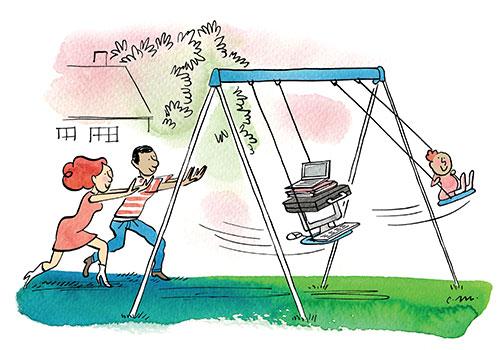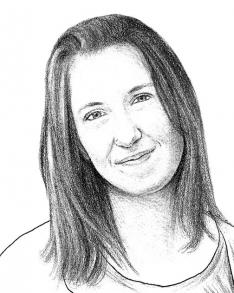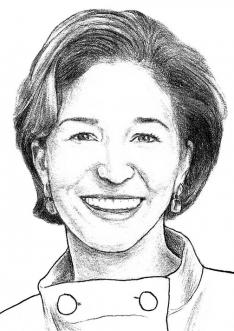Anne-Marie Slaughter ’80’s 2012 article in The Atlantic, “Why Women Still Can’t Have It All,” became a lightning rod for debates about feminism, the glass ceiling, and work-life balance. Now she has followed up with Unfinished Business: Women, Men, Work, Family, which explores prescriptions for achieving equality between men and women. Slaughter and Amelia Thomson-DeVeaux ’11 met in August via Skype to discuss how younger and older women view feminism, planning a career trajectory, and who should do the dishes.
Amelia Thomson-DeVeaux (ATD): Your article in The Atlantic, “Why Women Still Can’t Have It All,” drew a huge response. Many praised you, while others seemed to feel that they needed to jump to the defense of feminism.
Anne-Marie Slaughter (AMS): I never expected the article to go viral. I had never written anything that personal. It was the story of a woman who is a strong feminist and who has had every possible advantage in terms of fitting life and work together and who still couldn’t make it work. And that made me question what else we need to do to get to equality. I knew what I was writing felt heretical. But younger women had said to me, “I am sick of the ‘you can have it all’ stuff. We know it’s not true the way your generation thought it was true.” Lots of young women saw just how hard it is to combine caregiving and breadwinning, and they saw my generation’s struggles with infertility, and they said, “That isn’t the life I want.” I’m very open about the fact that I spent three years trying to have a child [before my sons were born], and it was the worst three years of my life.
So I knew we needed to have this round of the conversation. I saw it as a conversation advancing feminism, and many people read it as an attack on feminism, and there are lines that if you take them out of context, you could make it that. To me, the irony of the article is that I am now introduced as Anne-Marie Slaughter, who believes that women can’t have it all. No, this is Anne-Marie Slaughter who believes that women and men can be equal, and this is what we need to do to get there.
ATD: A lot of my friends in college, if you asked them if they identified as a feminist, they may have said yes, but they didn’t see feminist issues as particularly relevant or essential — certainly they were not involved in the activism in the way that I was. It was like, “I don’t want to be student-body president, so this doesn’t really affect me.” What I have noticed since I graduated — even in my Facebook feed — is that women my age are claiming feminism. It is important to them, to their work lives, and to their relationships with their partners.
The reports that young women are rejecting feminism — this has not been my experience. A lot of women identify themselves as feminist, and men too. I think a lot of that is going out into the workplace and being hit in the face with the realities of inequality. I did not negotiate my first salary as hard as I should have, and I really regret that now. I think that happens to a lot of women. I look back and say, “Wow, I was the most identifiable feminist on campus, and I still did that.”AMS: I am laughing. I just hired a new assistant and offered a salary, and she came back and asked for a higher salary and a signing bonus. She was in a very competitive position, there were three finalists, and I was sitting here thinking, she should be doing cartwheels, and she’s asking me for a raise? And so I gave her the higher salary. I say in my book: When a woman does that, I smile and tip my hat to [Facebook COO] Sheryl Sandberg. That class of issues are the Lean In issues. My category of issues are the unfinished-business issues, and they are both necessary. Negotiating a higher salary, speaking up — those are the things I have mentored young women on since I got into teaching. Speak in a loud voice, raise your hand, ask the first question, act like a man. That’s what it is — act like a man. You have to. Business culture is male culture.
I am talking about a set of issues that come later, and you cannot fix them just by trying harder, and you cannot fix them just with women. We will have arrived when I am having this conversation with you and a male graduate of 2011. Because the only way to get around the caregiving issue is to make it a male issue just as much as a female issue. As long as we are having this conversation with ourselves, we are announcing to the world that caregiving is a female issue. My proposition is, sorry, it takes two to make one, and it takes two to raise one. Similarly, if you are a daughter or son and your parents are aging — no, I am sorry, it is not [solely] the daughter’s responsibility. Real equality is equality in caregiving as well as breadwinning.
We had to make women powerful by allowing us to become our fathers. But that is an unfinished revolution. Only a tiny percentage of women can raise kids as a lead parent and be the professionals they want to be at the same time, because you have two full-time jobs. We expect female CEOs to do something that we would think is laughable if we asked it of male CEOs. Oh sure, you are traveling around the world and on call to your client all the time and in charge of a household, and you need to drop what you are doing and run to a teacher’s conference. If you have a really big job, your spouse will have to be the lead parent — not helping, but taking full responsibility for running most of the household.
After I wrote the article, when young men would come into my office at Princeton and say they wanted to be a high government official working on foreign policy, I’d say, now, are you thinking about having a family? If you are, have you thought about how you are going to fit the two together, and have you thought about a job at some point between age 30 and 50 that will have a little bit more flexibility? And I am not even talking about, have you thought about how you are going to support your wife’s career? I am talking about allocating responsibility equally.
ATD: In some ways it may be acting like the archetypal man, and in some ways it is just being able to recognize what you are giving to the work environment and being able to ask for rewards. That is something I have trouble doing sometimes. I think a lot of it has to do with gender socialization. I am a freelance journalist and a grad student right now, so I’m not making a whole lot of money. But of course, how much money you are making and where you are in your career really matter for how you see your future with a partner. How do you advise women to think about these issues while they are in their 20s and still figuring out what their career path will be?
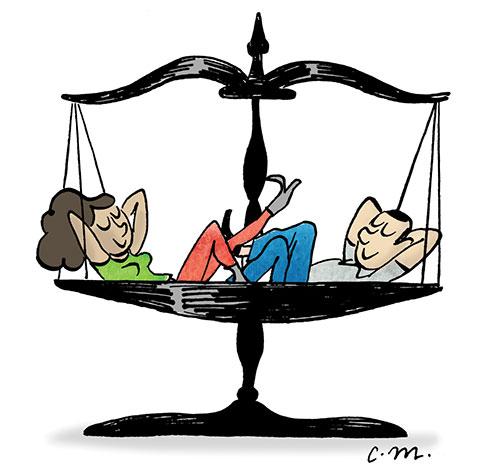
AMS: We need more women leaders — they will be more responsive to making it possible to fit work and life together. But the reality is that all human beings have this period of their lives when they will have caregiving responsibilities — if not for their children, then for their parents. Only when the man next to you feels that equally, and workplaces recognize it equally for women and men, are we going to get to a place where everybody has an equal shot at getting to the top.
ATD: If you frame it as a feminist issue, will it keep men out?
AMS: I do think it keeps men out. That’s why you need a men’s movement. You are seeing that in your generation. The men of your generation want to be engaged with their family. They need to say, “Hey, there is more to life than power and money and providing for a family.” Millennial men expect to be equal. I am not going to presume to shape that for men, but I think it is time that men stood up and said: “There is more to life.”
ATD: My worry is that if you make this mostly about men and bringing men back in, then the systemic discrimination against women that still exists gets ignored.
AMS: You are right. You are a Princeton/Chicago product! Here is how I would frame it. I would say it’s an equality issue — feminism is about equality. I am perfectly happy to call it a feminist issue in the sense that it is about the equality of men and women. Men and women will not be equal until men are equal, too.
ATD: I also think it is a cross-generational issue. When I hear this framed as a young-feminist issue, it makes me feel like the burden to change things is on women my age, and a lot of us are not in the position to do that. You point out that one of the things you were able to do as a leader is to set the tone in a workplace, to make it clear that family is important to you, and you are going to take time off for that, and everyone else should follow suit. That is not something I as a young woman in a workplace can necessarily do.
AMS: Yes, younger women are saying they want a different set of choices, and the mothers who fought so hard to have the choices they had in the workplace
went, whoa, what happened? The women 10 years ahead of me, they were the pioneers, and maybe they acted in all sorts of way we don’t love, but they had to do that. When I went to law school in 1982, there was one tenured woman on the Harvard law faculty — one. I never got taught by a woman. Ten years later, because of that first generation of women, when I was on the law-teaching market in 1990, it was an advantage to be a woman.
I am not saying there wasn’t still sexism and discrimination, because there was. But the fact is, 10 years later law schools looked around and said, “We really need more women.” So you start with real gratitude and respect for the previous generation, and then you say, revolutions evolve, and new issues arrive, and new champions arrive.
When I meet women of my generation, at least half of them are not very happy with me because of the Atlantic article. Women of my generation who were forced out of the workplace because of caregiving issues — and that’s how I think of it, they were shut out; they did not opt out — they are grateful for the article. But women who managed to make it work, they are often, let’s say, dubious. When I meet women of your generation, I just get a totally different response. It is overwhelming gratitude. They didn’t agree with everything I wrote, but they were grateful to me for opening the conversation.
ATD: It sometimes feels that the message is: If you can just time everything right, you can still do everything. But you can’t expect success all the time. What happens if your partner loses a job or your career stalls? How do you plan for that?
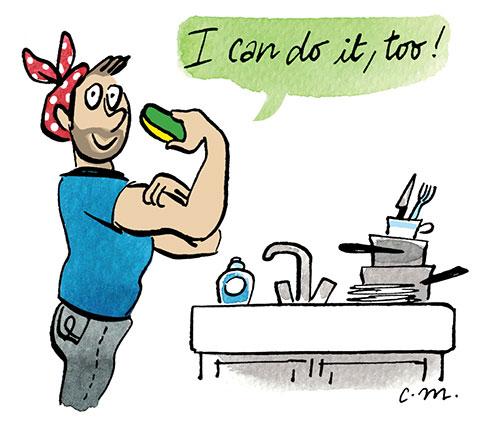
AMS: So many of us hit a tipping point. Even though I had power and income, that is what happened to me. I wanted to get into government in a high foreign-policy position, and when I got there, was going to ride that train to wherever it would take me. And when I got to that moment — the moment that in some ways I wanted all my life — my teenager went off the rails. In the annals of life’s misfortunes, it was hardly up there, but it was sufficient to make me realize that I had a choice, and I couldn’t choose to not be there for him, as ambitious as I was.
What I am saying is, there will be periods when you will be able to work hard, and there will be periods where there will be other things in your life that will be every bit as important. Look at you, you are already a journalist as well
as a graduate student. That’s great. If you want to be a professor, you have to think about the period when you get tenure. That is really tough. You have to say, do I have a kid early, or do I think about getting tenure and then having kids? And this is where the planning should be as mutual as possible, because you could do it if your husband or partner was really the lead. I say lead because if you are still managing him, forget it — that is an extra job. When I went to Washington — and even now — my husband [Andrew Moravcsik, professor of politics at Princeton] was in charge. Andy is back with our son Alexander right now while I am away for work, worrying about his SAT prep, and has he practiced his piano, and is he doing what he needs to be doing going into his junior year in high school. Am I involved? Absolutely. I have tasks and I am carrying them out, but I am not running the household.
ATD: One of the things I loved about your book was when you talked about women needing to let go. I feel that all the time. It is this question of, no, you don’t congratulate your boyfriend for doing the dishes. He should just do them. It is in his interest to have a clean sink, too. But it is really hard to do.
AMS: I agree. The hardest part is, he may have an interest in having a clean sink as much as you do, but his definition of clean may be very different. The only way I can get around this is to tell women to flip it: Imagine if you walked into your workplace and your boss told you that he was biologically better at doing the job but he thought you could do it if he left you a detailed enough list of tasks and checked in on you every couple of hours to make sure you had done them. You would sue him! If you and your husband are equal, then he gets an equal say as to what is important to him and how he wants things done, rather than your being the CEO at home and telling him what to do.
ATD: And letting go of guilt. I think that is also an incredibly important lesson. It is tough, because there is still so much pressure on women as mothers and as partners.
AMS: My mother said guilt is a useless emotion — it won’t do anything — and I believe it. It makes you feel bad, and it doesn’t get the work done. I do the best I can. I am proud of what I do. There are many things I wish I could do or wish I did better. But obsessing about that means I can’t enjoy the life I am living. I have to look at my kids and say, OK, there are so many things I didn’t do, but let’s look at what I did do. I read The Odyssey to them when they were really young. At the end of their lives, I think they are going to remember that. It’s like I say: If you are caught up on email, your priorities are in the wrong place. That can’t be what is important. I am always behind on something! That is just not what is important in life.
This conversation was moderated by PAW associate editor Jennifer Altmann and condensed.

